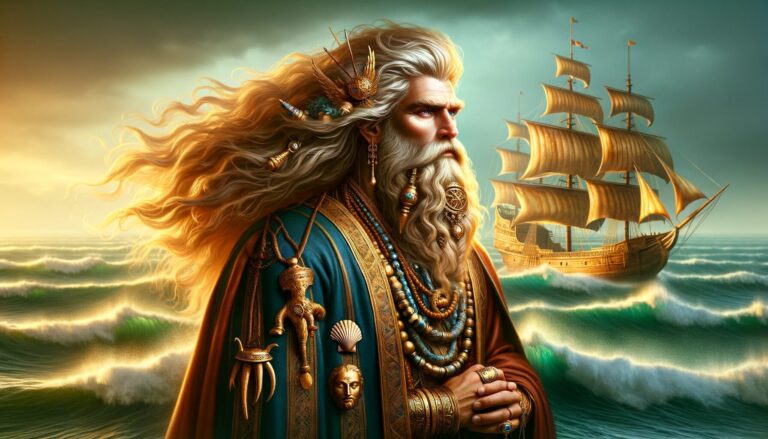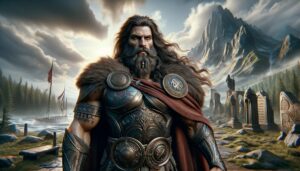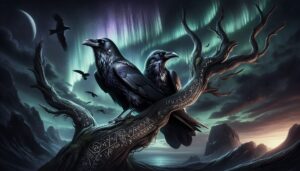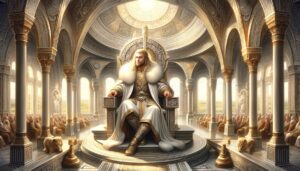Table of Contents
In the vibrant tapestry of Norse mythology, few deities are as intricately woven into the cultural fabric as Njord, the god of seafaring, wind, and wealth. Often depicted as a figure of great power and influence, Njord’s story is a fascinating journey through the realms of the Aesir and the Vanir, and his multifaceted attributes make him a central figure in the Norse pantheon.
Origins and Family
Njord, a member of the Vanir, a distinct group of Norse deities known for their connections to fertility, nature, and magic, emerged from a background steeped in myth a
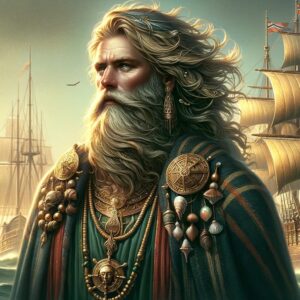
nd conflict. The Vanir gods engaged in an enduring feud with the Aesir, another group of deities, until a truce was brokered through a hostage exchange. In adherence to this peace treaty, Njord, along with his twin children, Frey and Freyja, was dispatched to reside among the Aesir.
While his parentage remains a topic of scholarly debate, certain sources propose that Njord may be the offspring of Nott, the goddess of night, and Annar. Such lineage aligns him with the intricate forces of nature and the cosmos, a fitting association given his dominion over the sea and the bounty it bestows.
Appearance
Mature and Regal Presence: Njord is often depicted as a mature and regal deity, reflecting his authority and power. His demeanor exudes wisdom and calm, reflecting his domain over the seas and the winds.
Golden Beard and Hair: Njord is frequently portrayed with a flowing, golden beard and long, wavy hair. This hair imagery is often likened to the undulating waves of the ocean, emphasizing his connection to the sea.
Fine Attire and Jewelry: As a god of wealth and prosperity, Njord is typically adorned in rich robes and jewelry that befit his status. His attire and ornaments symbolize his role as a deity associated with abundance and riches.
Nautical Elements: Some depictions of Njord may include nautical symbols or attributes, such as seashells, ships, or a ship’s helm, to emphasize his dominion over seafaring and navigation.
Imposing Stature: While not explicitly described as a giant, Njord is often portrayed as a powerful and imposing figure, reinforcing his importance among the Norse gods.
Abilities
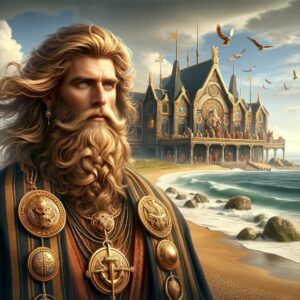
Njord’s powers are deeply connected to the natural elements he governs. His abilities include:
Control Over the Seas: Njord holds dominion over the sea and its bountiful resources. He can calm turbulent waters or stir up mighty storms, making him a revered figure among sailors and fishermen. Mariners would often invoke his name for safe voyages and abundant catches.
Wind Manipulation: As the god of wind, Njord possesses the ability to influence the direction and strength of the winds. This power was crucial in guiding ships and enabling trade and exploration across the Norse lands.
Wealth and Prosperity: Njord’s connection to wealth extends beyond material riches. He is also associated with the concept of prosperity and abundance, blessing those who honor him with good fortune, both in their endeavors and in their personal lives.
Fertility: Similar to many Vanir gods, Njord has ties to fertility and the cycles of nature. His blessings were sought by those who relied on the land for sustenance, as he could bring forth a bountiful harvest.
Weaknesses
Despite his divine stature, Njord possesses vulnerabilities. His association with the sea occasionally results in unpredictable consequences due to the ocean’s capricious nature. Storms, tempests, and other maritime hazards may pose threats, even to a god of Njord’s caliber. Furthermore, his separation from his twin children, Frey and Freyja, during the peace treaty between the Vanir and Aesir, has left him with a lingering sense of longing and melancholy, potentially exploitable.
Behavior with Humans
Njord is generally depicted as a benevolent and approachable deity. He is known to be sympathetic to the struggles of mortals, particularly those who make their living on the sea. Sailors and fishermen would often offer prayers and sacrifices to Njord before embarking on their journeys, seeking his protection and favor.
Furthermore, Njord’s connection to wealth and prosperity made him a patron of traders and merchants. Norse traders would invoke his name to ensure successful voyages and lucrative business deals. He was seen as a source of economic stability and growth in the Norse world.
Njord’s role in fertility rituals and agricultural ceremonies also endeared him to the common people. Farmers and villagers would beseech him for fertile soil and abundant crops, recognizing his importance in sustaining their communities.
Where does Njord lives?
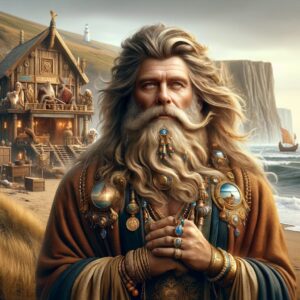
Njord, the Norse god of the sea, primarily associated himself with the coastline and coastal areas. Although Norse mythology does not extensively describe his dwelling place, it is generally believed that he inhabited a magnificent hall known as “Noatun,” which translates to “ship enclosure” or “ship haven.” Noatun’s location by the sea emphasized Njord’s strong connection to maritime elements.
Norse texts provide relatively scarce descriptions of Noatun, but they commonly envision it as a grand hall or mansion adorned with riches and symbols representing Njord’s domain. As the god of wealth and prosperity, one would expect his abode to reflect his elevated status. While interpretations may vary in terms of exact details, Noatun is often depicted as a place of opulence, where seashells, maritime motifs, and treasures from the sea adorn its halls.
The surroundings of Noatun would include coastal landscapes, with sandy shores meeting the vast ocean. It would be a place where the gentle lapping of waves against the shore and the soothing sound of the sea would be constant companions, reflecting Njord’s dominion over the waters.
Although the precise appearance of Noatun and its surroundings may vary in different artistic depictions and interpretations, it is commonly imagined as a place of beauty, abundance, and tranquility, mirroring Njord’s role as the god of the sea and wealth in Norse mythology.
Symbols Representing Njord
Symbols associated with Njord often reflect his domains and attributes:
Seashells: Seashells, particularly those found along coastlines, are considered sacred to Njord. They symbolize his connection to the sea and its treasures.
Ship’s Helm: A ship’s helm is another symbol associated with Njord. It represents his role as the god of seafaring and navigation, guiding ships safely through the treacherous waters.
Golden Wheat: As a symbol of abundance and fertility, golden wheat represents Njord’s connection to the land and the prosperity he bestows upon those who honor him.
Myths and Stories
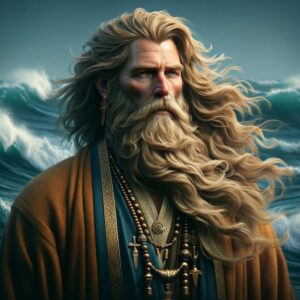
Njord’s presence in Norse mythology is intertwined with various tales and legends:
The Marriage to Skadi
In the realm of Norse mythology, the union of Njord, the god of the sea, and Skadi, a formidable giantess, is a renowned tale marked by the clash of two worlds and the ultimate separation of this divine couple. This captivating narrative began as part of a negotiated peace agreement between the Aesir and the Vanir, two distinct groups of Norse deities.
Skadi, driven by a desire for retribution following the death of her father, Thjazi, at the hands of the Aesir, sought compensation and the opportunity to marry one of the Aesir gods. The Aesir agreed to her demand, but an unusual condition was set: she must select her spouse solely based on his feet, with his face remaining hidden.
Skadi accepted this arrangement, believing she had chosen the radiant god Balder, renowned for his beauty. However, to her surprise and disappointment, the feet she had chosen belonged to Njord, the god of the sea, known for his sea-soaked appearance.
The conflict between Njord and Skadi stemmed from their contrasting preferences for their places of residence. Njord, as a deity of the sea, yearned for the coastal shores, where he could revel in the soothing presence of the ocean and the calming sound of the waves. In contrast, Skadi felt most at home in the mountains, where she found solace among the towering peaks and snow-covered landscapes.
Their irreconcilable desires for their respective homes created tension within their marriage. Njord found the harsh mountain environment unbearable, while Skadi could not find comfort or happiness amidst the noisy and disruptive sea.
Recognizing the futility of their situation and the unhappiness it brought them both, Njord and Skadi made the amicable decision to part ways. They acknowledged that their deeply ingrained preferences could not be resolved, leading to their peaceful separation.
The Treasures of the Sea
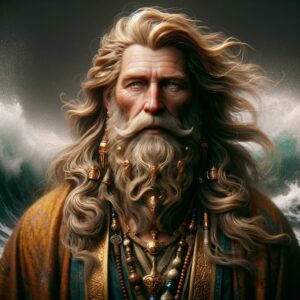
In the coastal villages of the Norse lands, a dire famine gripped the communities. Dependent on the sea for sustenance, the people faced dwindling catches and the looming threat of starvation. Desperation and despair shadowed the once-thriving fishing villages.
In this dire situation, the people turned to Njord, the deity known for his dominion over the sea. Gathering at the shoreline, they offered heartfelt prayers and sacrifices, beseeching his aid. Njord, ever watchful and sympathetic to mortal struggles, heard their pleas and took action.
As a gesture of benevolence and power, Njord summoned the sea’s abundant and diverse fish to the shores. Waters teemed with life as fish of all sizes and species swarmed fishermen’s nets, practically leaping into boats. It was a miraculous sight, as the sea yielded treasures in unprecedented abundance.
Overjoyed, fishermen and sailors secured their livelihoods, and families no longer faced famine. Njord’s intervention not only provided sustenance but also renewed hope. Gratitude to the god knew no bounds.
Njord’s compassion and generosity reminded all of his vital role in the lives of those dependent on the sea. He showed that, even in dire circumstances, the sea could offer abundance and prosperity when its domain was honored.
This tale of Njord’s intervention is a poignant testament to his role as protector and provider for fishermen and sailors. Through his control over the sea’s bounty, he ensured their survival and prosperity, highlighting how the connection between gods and mortals in Norse mythology often transcended the divine, offering solace and hope in times of need.
Frey and Freyja
Related Myths and Beings
Njord’s association with the Vanir gods connects him to a host of other deities from that pantheon. Frey and Freyja, his children, are central figures in Norse mythology and have their own intriguing stories. Furthermore, beings such as Skadi, the giantess to whom he was briefly wed, and Aegir, the god of the sea, establish thematic connections with Njord owing to their affiliations with nature and the ocean.
In conclusion, Njord, the Norse god of seafaring, wind, and wealth, is a complex and multifaceted deity whose influence spans the realms of nature, commerce, and the human condition. His benevolent nature and connection to the elements endeared him to both sailors and land-dwellers alike, making him a symbol of prosperity and protection in the Norse world. Njord’s rich mythology and associations with other deities offer a captivating glimpse into the intricate tapestry of Norse beliefs and culture.
FAQ
What are Njord's main attributes and domains?
Njord is known for his control over the sea, making him the god of seafaring, fishing, and navigation. He is also associated with wealth and prosperity, particularly in relation to the sea's bounty.
What is the story of Njord's marriage to Skadi?
Njord's marriage to Skadi, a giantess, was arranged as part of a peace agreement between the Aesir and the Vanir. However, their mismatched preferences for their homes led to their separation.
What are Njord's vulnerabilities?
Despite his divine status, Njord can be vulnerable to the unpredictable nature of the sea, including storms and maritime hazards. He also experiences a sense of longing due to his separation from his twin children, Frey and Freyja.
What is Njord's lineage?
Njord's parentage is a subject of debate among scholars, but some sources suggest he may be the son of Nott, the goddess of night, and Annar, aligning him with natural and cosmic forces.
What symbols are associated with Njord?
Njord is often symbolized by nautical elements, such as seashells, ships, or a ship's helm, to represent his connection to the sea and seafaring.
How did Njord assist fishermen and sailors in Norse mythology?
Njord's benevolence was showcased through tales of him granting abundant catches to fishermen and sailors during times of need, ensuring their survival and prosperity.
Is Njord still worshipped today?
Norse mythology is no longer a widely practiced religion, but some individuals with Norse pagan beliefs or an interest in mythology may honor Njord and other Norse deities in modern rituals and practices.
Are there any famous stories or myths involving Njord?
Yes, besides his marriage to Skadi, Njord appears in various Norse myths and sagas, often related to the sea, wealth, and natural elements.
